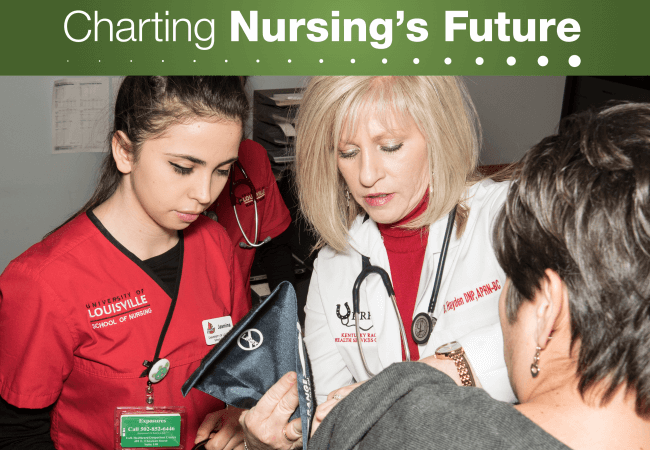
Apr 30, 2018
Kentucky Clinic Opens Students’ Eyes

Kentucky Racing Health Services Center Director Dedra Hayden, MSN, CDE, APRN-C, at center, demonstrates to nursing student Jasmina Disdarevic how to take a patient’s blood pressure. Photo credit: Tom Fougerousse, University of Louisville
Sometimes transformative nursing education can take place in the community, with patients who earn very little, speak limited English, and may not read.
Patients at the Kentucky Racing Health Services Center typically hail from Mexico and Guatemala. They come to the U.S. to work as contract employees and exercise, feed, and shampoo the racehorses at Louisville’s Churchill Downs racetrack.
Every semester, a handful of nursing and nurse practitioner students undertake clinical rotations at the Racing Health Services Center. One of those students was Dedra Hayden, MSN, CDE, APRN-C. Today she is an assistant professor at the University of Louisville School of Nursing and the clinic’s director.
“The clinic is my true love,” says Hayden. “We have the opportunity and resources to really care for our patients. You get to know them; you understand their struggles; you see them smile when they walk in.”
At the start of the student rotations, aspiring nurses are asked to contemplate how they would instruct a patient with diabetes, a poorly equipped kitchen, and a $30 weekly food budget to plan meals. Exposing students to these realities pushes them to solve problems creatively and sensitively, Hayden says. Those who visit the clinic have language barriers, low levels of health literacy, and occasionally, fatalistic views that may lead them to refuse screenings or immunizations. These encounters expose students to a new culture. Students are also forced to sharpen their diagnostic skills in the absence of high technology equipment.
“It’s quite an adjustment,” says Hayden. “You have to have really good assessment skills and know when to worry about your patients.”
In addition to serving as a teaching laboratory for nursing students, the clinic also offers dental students a one-year residency and gives liberal arts students who are fluent in Spanish an opportunity to contribute their skills as translators.
One such student, Kristen Connors, started volunteering at the clinic in 2014. She loved the experience so much, she continued on as a mental health interpreter for more than a year. Today, she is in her final semester in the University’s nursing program. “After my experience working with nurse practitioners who also taught and did research, I was inspired to go back to school for nursing,” Connors said. She plans to graduate this spring with a master’s degree. She still intends to pursue doctoral study, but she is looking forward to impacting peoples’ lives by providing direct patient care as a nurse.
